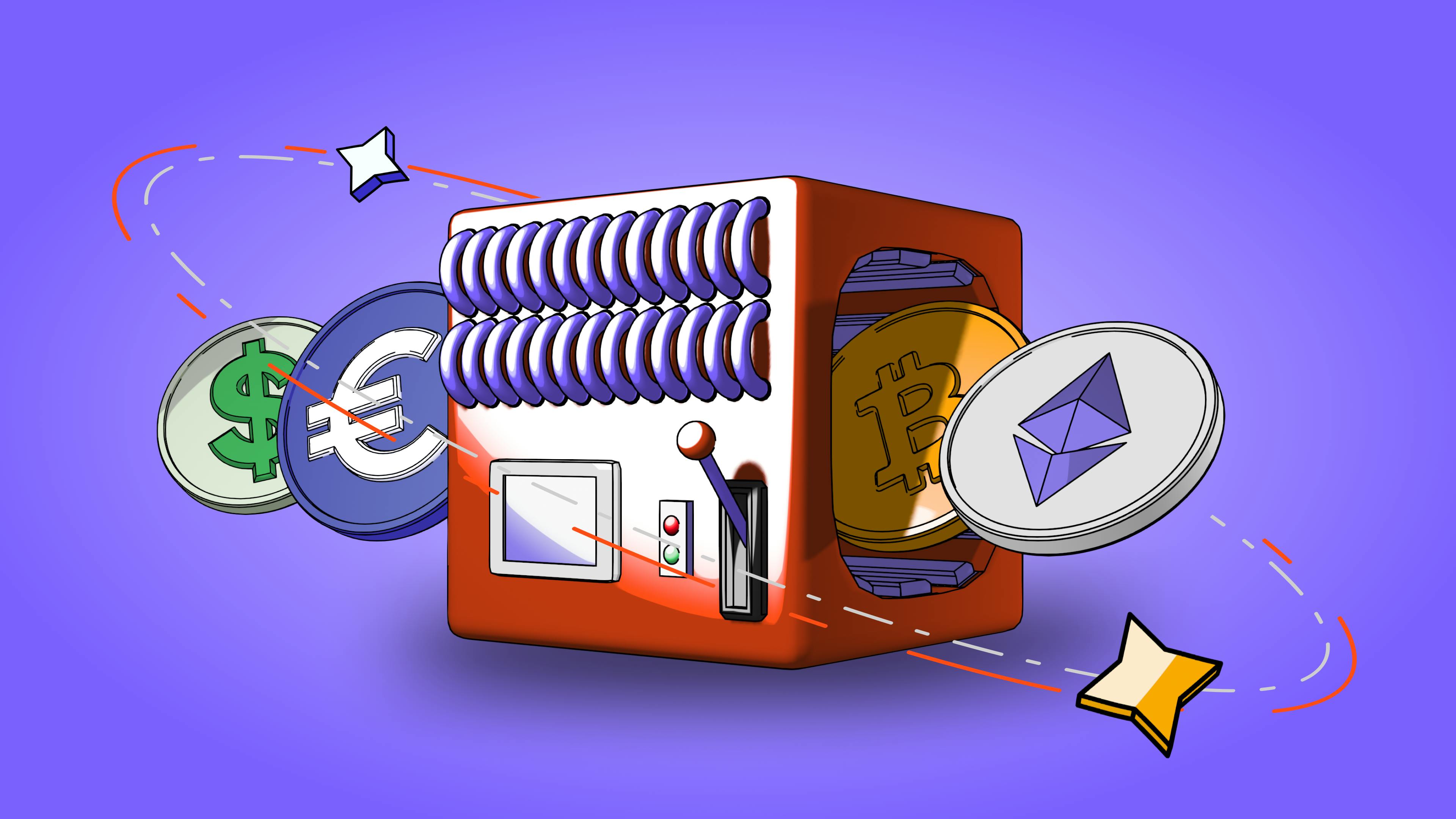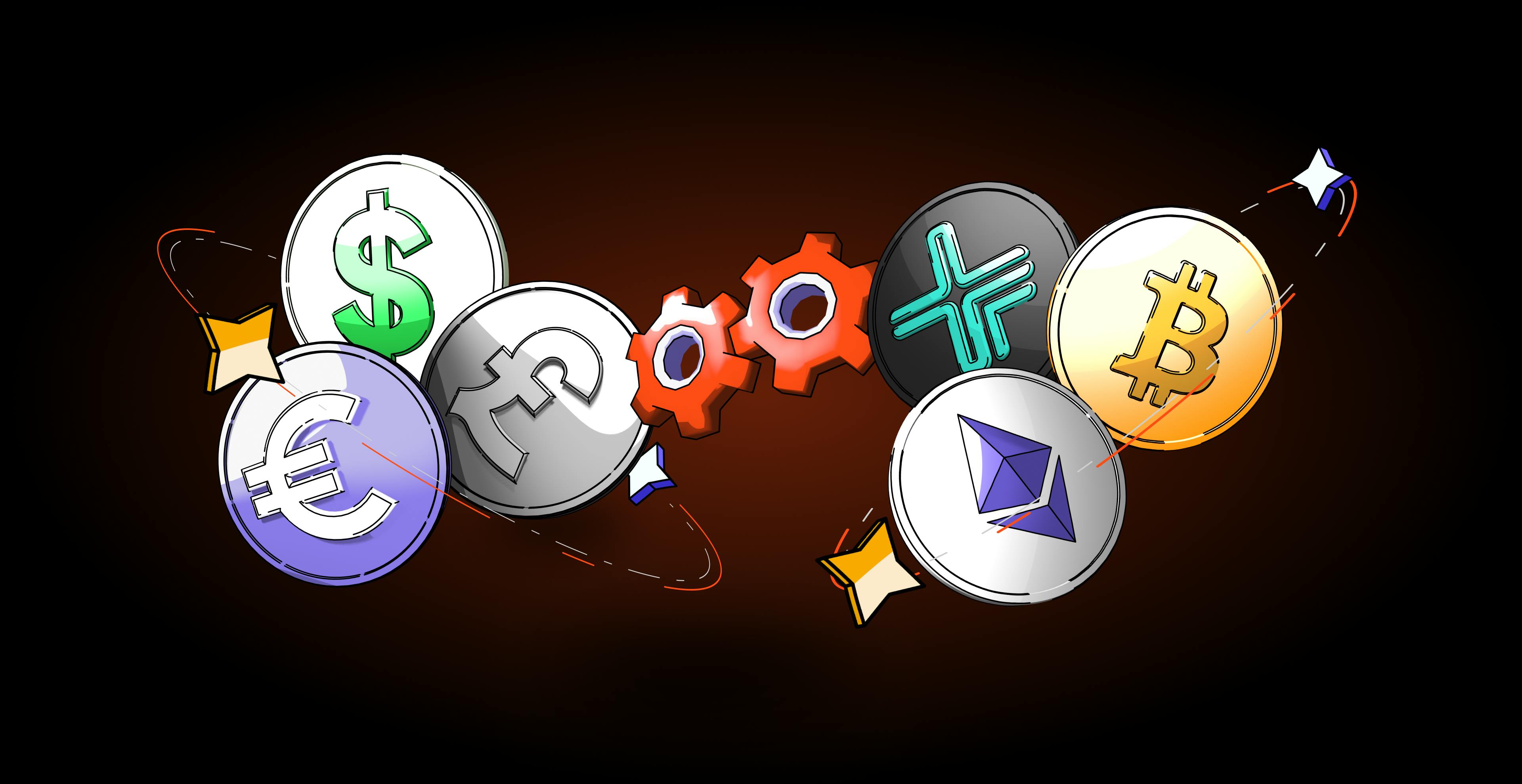Payments & On/Off Ramp Solutions in Crypto
December 5, 2025

by Kamil S
December 5, 2025
If we’re talking crypto, payment and on/off ramp solutions stand as crucial cornerstones, seamlessly connecting the virtual and tangible worlds.The way money enters and exits the crypto ecosystem plays a pivotal role in fostering wider adoption and utilization of digital assets, transcending the realm of speculative investments.
Payment solutions function as bridges, facilitating secure and efficient transactions while dissolving the barriers between traditional finance and the burgeoning crypto landscape. As cryptocurrencies mature from their nascent stage, integrating seamless payment mechanisms becomes paramount. This journey towards mainstream integration underscores the transformative potential of cryptocurrencies in revolutionizing how we transact, ushering in a new era of financial dexterity and accessibility.
Simply put, on/off ramp solutions serve as the entry and exit points to the crypto landscape.
Think of on-ramps as the point where you exchange your traditional currency for digital coins, enabling you to embark on your crypto journey. These on-ramps may encompass various solutions like exchanges, crypto wallets, or even physical, bricks-and-mortar crypto shops and crypto ATMs.
Conversely, off-ramps allow you to transition your digital wealth back into fiat currency or other tangible assets. Such solutions facilitate converting your cryptocurrencies into spendable funds, bridging the gap between the crypto and traditional economies.
On-ramps and off-ramps are the gateways to a realm where finance meets innovation. Whether you're embarking on a crypto adventure or cashing in on your digital gains, always choose on-ramps and off-ramps that will ensure your journey is exciting, efficient, and secure.
Embarking on your journey into the realm of cryptocurrencies requires a reliable gateway, and that's where on-ramp crypto solutions come into play. These platforms seamlessly enable you to convert your traditional currency into digital assets.
Centralized exchanges (CEXs) offer a user-friendly haven for both beginners and seasoned traders, providing a hub where you can effortlessly swap your hard-earned money for your desired crypto assets like Bitcoin, Ethereum, or a myriad of altcoins. With intuitive interfaces and innovative products, established centralized exchanges offer a bustling ecosystem for trading and investment. With CEXs, the platform’s custodial wallet safeguards your funds and all users are required to verify their profile in order to ensure a transparent and secure financial system. Choosing a reputable and regulated centralized crypto exchange such as Coinmetro is paramount regardless if you are a beginner or pro.
Imagine a marketplace without a central authority – where peer-to-peer transactions occur directly, putting you in control of your assets. DEXs empower you to trade in a fully decentralized environment, offering enhanced privacy and security. However, certain DEXs may not be so user-friendly and easy to use, requiring a bit of a learning curve for those new to the decentralized exchange landscape. The absence of a central authority means that the responsibility for conducting due diligence on projects, understanding trading interfaces, and managing private keys falls squarely on the user's shoulders. While DEXs offer unparalleled control and privacy over your funds, this decentralized nature can sometimes lead to fragmented liquidity. Furthermore, a decentralized exchange emphasizes anonymity and typically does not require users to verify their profile.
Certain digital and physical wallets also provide on-ramp solutions, offering distinct yet complementary paths into the world of cryptocurrencies. These dynamic tools cater to various preferences, empowering individuals to seamlessly transition from traditional finance to the realm of digital assets.
Specific wallet models from Ledger and Trezor provide a secure and convenient on-ramp for individuals seeking to enter the world of cryptocurrencies. The wallets usually work with an app, allowing users to purchase cryptocurrencies directly from within the app and transfer them to their secure, offline wallet for safekeeping.
Both digital and physical wallets play a pivotal role in simplifying the on-ramp process. Digital wallets streamline transactions, offering swift access to a world of digital assets. Physical wallets embody security, granting you control over your investments beyond the digital realm.
Picture walking into your local café, scanning a QR code, and buying some Bitcoin to go with that morning coffee. While this may seem surprising for some, crypto physical stores and ATMs have been around since the early days of digital assets, with their presence gradually increasing over the years.
When you buy crypto at an ATM or physical store, the process may involve transferring ownership of the purchased cryptocurrency from the store's wallet to your own personal crypto wallet. You may simply open your wallet app and scan the QR code displayed by the store or ATM. This code contains all the essential transaction details, ensuring accuracy and security. Your confirmation sets in motion a series of cryptographic events on the blockchain network. This intricate web of secure verification ensures the legitimacy of the transaction, verifying the availability of funds and confirming your ownership of the assets. As the blockchain network confirms the transaction, the purchased cryptocurrency takes flight, leaving the store's or ATM's wallet behind and landing safely in your personal crypto wallet.
Through a centralized exchange, you can seamlessly swap your cryptocurrency holdings for traditional currency like the US Dollar or Euro. With liquidity at your fingertips and a wide range of trading pairs, centralized exchanges ensure that your exit is both efficient and well-guided.
Often backed by established payment networks, crypto Debit Cards offer a tangible connection between the crypto realm and traditional financial infrastructure. The process begins when you decide to make a withdrawal using your crypto-backed debit card. The crypto debit card provider's system springs into action and initiates an instantaneous exchange from the selected cryptocurrency (such as Bitcoin or Ethereum) to the local fiat currency (e.g., US Dollar, Euro, etc.).
The provider's system calculates the current exchange rate between the cryptocurrency and the chosen fiat currency, ensuring that you receive an accurate value for your transaction. This calculation is based on live market data and exchange rates.
Decentralized, P2P platforms connect buyers and sellers directly, allowing users to trade cryptocurrencies for fiat currency or other assets. These platforms provide a decentralized off-ramp option, enabling individuals to directly negotiate and execute transactions between them without intermediaries. While such platforms offer anonymity and full control of assets, they might not be so user-friendly and regulated as more popular centralized exchanges.

As the digital economy continues to flourish, the evolution of crypto payment methods has been a dynamic journey, filled with both opportunities and hurdles. Looking forward, several challenges need to be considered:
Volatility: Cryptocurrencies are infamous for their price volatility, posing a challenge for merchants and consumers alike. The fluctuating value can lead to uncertainty in pricing and hinder the seamless use of cryptocurrencies for everyday transactions.
Regulatory Landscape: Navigating the complex and ever-changing regulatory landscape remains a hurdle. Divergent regulations across countries create a patchwork of compliance requirements that payment providers must grapple with.
User Experience: Ensuring a user-friendly experience for both merchants and consumers is paramount. Cryptocurrency transactions often require a certain level of technical knowledge, hindering mainstream adoption.
Scalability: As the popularity of cryptocurrencies surges, scalability issues have arisen, causing delays and increased fees during peak transaction periods.
But with every challenge, there is opportunity:
Stablecoins: These cryptocurrencies are pegged to a stable asset like fiat currency, minimizing price volatility and offering a more reliable medium of exchange.
Layer-2 Solutions: Innovations like the Lightning Network for Bitcoin and Ethereum's Layer-2 scaling solutions are addressing scalability concerns, enabling faster and cheaper transactions.
User-Friendly Wallets and Platforms: User experience is undergoing a facelift, with intuitive wallets and platforms simplifying crypto payments for everyone.
NFT Integration: The Non-Fungible Token (NFT) craze has extended to payments, enabling unique and valuable transactions through blockchain technology.
The integration of cryptocurrencies into mainstream payment systems is a monumental step toward reshaping the financial landscape and realizing the true potential of digital currencies. As the world embraces the digital revolution, the fusion of traditional payment methods with the innovation of blockchain technology heralds a new era of convenience, accessibility, and inclusivity. Here are some important steps:
Merchant Adoption: Increasing numbers of merchants are embracing cryptocurrency payments, broadening the scope of goods and services that can be purchased using digital assets. From online retailers to local businesses, the acceptance of cryptocurrencies adds a new dimension to the way we transact.
Payment Processors and Gateways: Payment processors are evolving to facilitate crypto transactions seamlessly. Cryptocurrency payment gateways enable merchants to accept digital currencies alongside traditional methods, fostering a cohesive and diversified payment landscape.
Peer-to-Peer Transactions: Cryptocurrencies empower individuals to engage in peer-to-peer transactions across borders, eliminating intermediaries and reducing transaction fees. This inclusive approach opens doors for the unbanked and underbanked populations to participate in the global economy.
The catalysts of transformation:
Stablecoins: The introduction of stablecoins offers stability in an otherwise volatile market, making cryptocurrencies more practical for day-to-day transactions. These pegged digital assets bridge the gap between the crypto realm and traditional fiat currency.
Payment Industry Collaborations: Collaborations between fintech companies, established financial institutions, and blockchain projects are propelling the integration of cryptocurrencies. These partnerships foster innovation, accelerate adoption, and lay the groundwork for a unified payment ecosystem. Moreover, the sustained common effort incentivizes government bodies to respond with regulation and legislation that supports innovation.
Supportive Regulation: While the integration of cryptocurrencies into mainstream payment systems offers remarkable promise, challenges persist. Regulatory clarity, security concerns, and user education are pivotal areas that demand attention. Addressing these challenges will pave the way for a more inclusive, efficient, and borderless financial future.
The integration of cryptocurrencies into mainstream payment systems is not a mere technological transition; it's a transformative journey that empowers individuals, businesses, and economies to transcend traditional limitations. With each step toward integration, the vision of a decentralized, accessible, and secure financial ecosystem inches closer to becoming a remarkable reality.
On/Off ramp solutions & crypto payments play a pivotal role in shaping how money enters and exits the crypto ecosystem, transcending speculative investments and fostering wider adoption.
As cryptocurrencies mature, the quest for seamless payment mechanisms gains prominence.
From the inception of on/off ramps to the adoption of innovative payment methods, the evolution of crypto payments is a tale of bridging gaps and unlocking possibilities. With every advancement, the fusion of traditional finance with the blockchain revolution becomes more apparent, setting the stage for a future where cryptocurrencies seamlessly blend into our daily transactions.
Facing challenges head-on, the crypto payment landscape is witnessing remarkable innovations that address volatility, scalability, user experience, and regulatory clarity. These innovations, driven by stablecoins, Layer-2 solutions, user-friendly wallets, and even NFT integrations, reshape the way we perceive and utilize digital currencies.
In the realm of mainstream integration, merchant adoption, payment processors, and peer-to-peer transactions will help drive the new financial ecosystem. Furthermore, corporate-level collaborations and supportive regulations pave the way for a unified payment landscape, bridging the gap between traditional finance and the blockchain revolution.
The integration of cryptocurrencies into mainstream payment systems represents more than just a technological shift; it's a profound transformation that empowers individuals and economies to break free from conventional constraints. With every step taken, we inch closer to a reality where cryptocurrencies seamlessly coexist with traditional finance, propelling us into a future where financial accessibility and innovation know no bounds.
Join the Coinmetro community on Discord and Telegram, where forward-thinking traders and investors gather to share insights, explore new opportunities, and dive deep into the world of cryptocurrencies. Should you need any help, feel free to reach out to our world-class Customer Support Team via 24/7 live chat or email at hello@coinmetro.com.
To become a Coinmetro user today, Sign Up now, or head to our new Exchange if you are already registered and experience our premium trading platform.
Tags
Related Articles

Regulatory Sandboxes: Fostering Crypto Innovation Within Legal Frameworks
The cryptocurrency industry’s fast rise fuels an important debate. Innovation aims to transform finance, enhancing speed and access. Yet, regulators…
5m

Crypto Options Trading: Strategies and Market Insights
Cryptocurrency markets have rapidly expanded beyond simple buying and selling. One of the most significant developments has been the rise of…
6m

The Rise of Social-Fi: Blending Social Media with Decentralized Finance
In recent years, social media and finance have started to merge, creating Social-Fi. This concept blends the engagement of social platforms with…
6m

DeFi Insurance Platforms to Watch in 2024
Decentralized Finance (DeFi) insurance addresses the growing need for insurance against hacks, smart contract failures, and other DeFi-related risks.…
7m